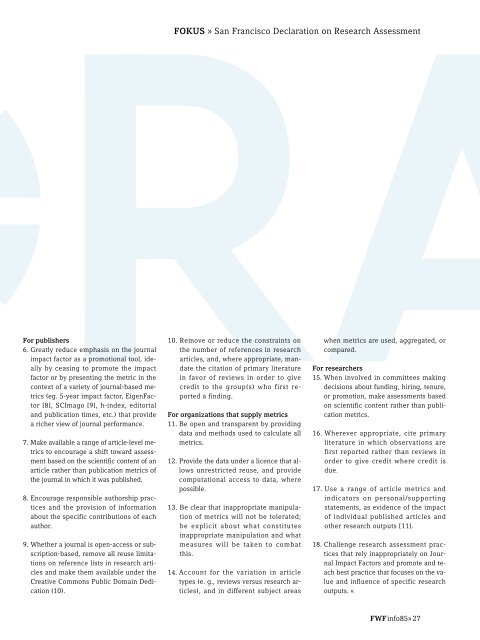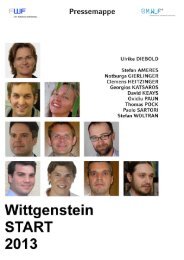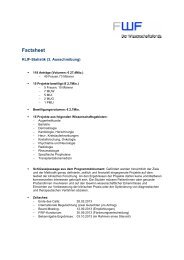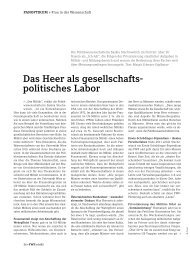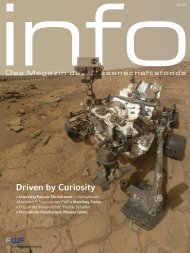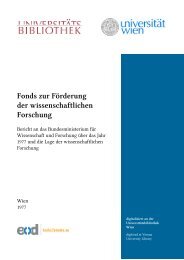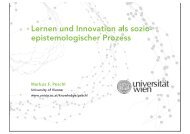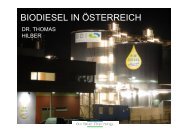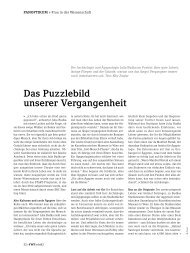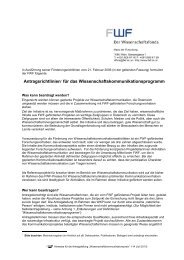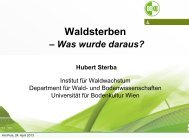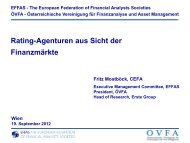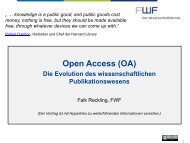Pascale Ehrenfreund neue FWF-Präsidentin
Pascale Ehrenfreund neue FWF-Präsidentin
Pascale Ehrenfreund neue FWF-Präsidentin
Sie wollen auch ein ePaper? Erhöhen Sie die Reichweite Ihrer Titel.
YUMPU macht aus Druck-PDFs automatisch weboptimierte ePaper, die Google liebt.
FOKUS » San Francisco Declaration on Research Assessment<br />
For publishers<br />
6. Greatly reduce emphasis on the journal<br />
impact factor as a promotional tool, ideally<br />
by ceasing to promote the impact<br />
factor or by presenting the metric in the<br />
context of a variety of journal-based metrics<br />
(eg. 5-year impact factor, EigenFactor<br />
[8], SCImago [9], h-index, editorial<br />
and publication times, etc.) that provide<br />
a richer view of journal performance.<br />
7. Make available a range of article-level metrics<br />
to encourage a shift toward assessment<br />
based on the scientific content of an<br />
article rather than publication metrics of<br />
the journal in which it was published.<br />
8. Encourage responsible authorship practices<br />
and the provision of information<br />
about the specific contributions of each<br />
author.<br />
9. Whether a journal is open-access or subscription-based,<br />
remove all reuse limitations<br />
on reference lists in research articles<br />
and make them available under the<br />
Creative Commons Public Domain Dedication<br />
(10).<br />
10. Remove or reduce the constraints on<br />
the number of references in research<br />
articles, and, where appropriate, mandate<br />
the citation of primary literature<br />
in favor of reviews in order to give<br />
credit to the group(s) who first reported<br />
a finding.<br />
For organizations that supply metrics<br />
11. Be open and transparent by providing<br />
data and methods used to calculate all<br />
metrics.<br />
12. Provide the data under a licence that allows<br />
unrestricted reuse, and prov ide<br />
computational access to data, where<br />
possible.<br />
13. Be clear that inappropriate manipulation<br />
of metrics will not be tolerated;<br />
be explicit about what constitutes<br />
inappropriate manipulation and what<br />
measures will be taken to combat<br />
this.<br />
14. Account for the variation in article<br />
types (e. g., reviews versus research articles),<br />
and in different subject areas<br />
when metrics are used, aggregated, or<br />
compared.<br />
For researchers<br />
15. When involved in committees making<br />
decisions about funding, hiring, tenure,<br />
or promotion, make assessments based<br />
on scientific content rather than publication<br />
metrics.<br />
16. Wherever appropriate, cite primary<br />
literature in which observations are<br />
first reported rather than reviews in<br />
order to give credit where credit is<br />
due.<br />
17. Use a range of article metrics and<br />
indicators on personal/supporting<br />
statements, as evidence of the impact<br />
of individual published articles and<br />
other research outputs [11].<br />
18. Challenge research assessment practices<br />
that rely inappropriately on Journal<br />
Impact Factors and promote and teach<br />
best practice that focuses on the value<br />
and influence of specific research<br />
outputs. «<br />
<strong>FWF</strong>info85» 27


